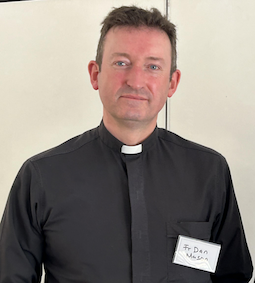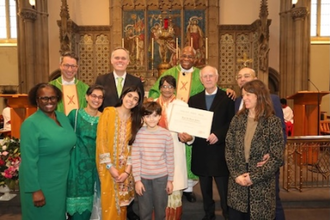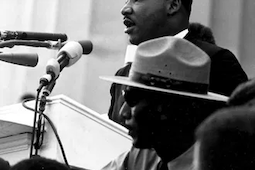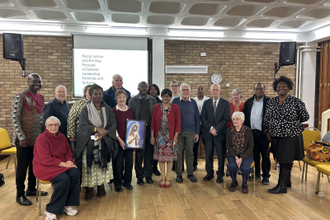Text: Fr Dan Mason at CARJ anniversary

Fr Dan Mason Image ICN/JS
Fr Dan Mason, Chaplain to the Gypsies, Roma and Travellers in Brentwood Diocese gave this address last Saturday at the CARJ 40th anniversary gathering in Amigo Hall, Southwark.
Good morning everybody. My name is Father Dan Mason and I am joined today by Charlie Doherty who works for the Traveller Movement. I am going to do my presentation first and then Charlie is going to tell you a little bit about himself and about the work of the Traveller Movement.
Now recently I was asked by two teachers who are studying for the CCRS certificate whether I would be prepared to do a sit down interview with them. And one of the questions that they had asked me during the course of the interview was: "What has been your journey to the role that you have within the Church?"
It's an interesting question and one that priests don't normally spend too much time thinking about. Normally in my experience with the Church you end up being given a job when you nip out of a meeting to go to the loo. So how did I end up here, standing in front of all of you talking about chaplaincy to Gypsies, Roma and Travellers?
Well, I was ordained a priest in 2003, but my interest in working with Gypsies, Roma and Travellers began in 2010 when I was appointed as Parish Priest to the Parish of Our Lady of Good Council in Wickford in Essex. This was my first appointment as Parish Priest and normally in your first appointment, the Bishop tries to send you to a small parish where nothing much happens in order for you to develop your skills, before then moving you on to a much bigger parish later on. This was largely true of the Catholic Church in Wickford, except for one thing: within the parish boundary it had the largest Traveller site in the country,Dale Farm. Not only that, the local council, Basildon Council, had also been attempting for many years to clear part of the site which had been built on without planning permission. This had been a former scrap yard but was still technically green belt land.
So far from being a small quiet country parish where nothing ever happens, instead I found myself at the centre of an increasingly bitter fight between the Council and the local residents surrounding the site on the one hand, and the families who were living on the site on the other. After a series of legal disputes, the Council was able to secure permission to clear the unauthorised part of the site and on the 19th September, 2011 the Police came in riot gear and forcibly removed the families and the protesters who had joined the families to fight the eviction.
In the event, the whole eviction cost the Council £5million and the result was that the site where the clearance took place went from looking like this ( there had been neat rows of caravans with flowers and even a little shrine to Our Lady. JS) to looking like this (scene of total wreckage and demolition). As you can imagine this had a devastating impact on the families, many of whom had young children who had to witness their homes being destroyed.
But there were a few positives that came out of the Dale Farm evictions.
Firstly, the eviction was so expensive and the publicity surrounding it was so damaging to the Council that no other local authority is likely to ever attempt and eviction on the scale of the one we saw at Dale Farm.
But secondly, the effect of the eviction was to encourage statutory authorities to work more closely in offering support to those who are still resident on the site. I am part of a working group which was set up after the eviction and which has representatives from the Fire Service, the Police, the Essex Countrywide Traveller Unit, Basildon Council and the local Health Authorities all sitting on it. I am also proud to be a member of the Governing Body of Crays Hill School. The school currently has an intake which is almost all Traveller children and throughout the eviction the school remained open, to provide some sense of normality. Since then, the school has been inspected by Ofsted twice and both times it has achieved a 'good' rating because the inspectors have been able to look beyond the attendance figures to see the incredible work that the teachers at Crays Hill do, often without knowing from day to day how many children they will have in their classrooms.
On a personal level the eviction also had a profound effect. The experience of supporting families on the site many of whom were my parishioners, awakened an interest in working with members of the Travelling communities which continued after I ceased to be Parish Priest in Wickford. In 2015 my Bishop asked be whether I would like to become the National Catholic Chaplain for Gypsies, Roma and Travellers and with some trepidation I accepted the position. Now clearly there was no way that I would be able to cover the whole of the country - even if I did own a caravan - but with the support of Bishop Paul and Bishop Tom Williams from Liverpool Diocese I was able to get in contact with priests and religious across the country who were already working with Travelling Communities and we were able to exchange ideas and share good practice. Alongside this I was greatly supported by CARJ and in particular the Traveller Interest Working Group facilitated by Richard Zipfel, which meets four times a year. Before the pandemic we used to meet physically. Now we meet virtually and the group is made up of chaplains, charities working with Travellers and other interested groups to see how were can support Travelling Communities from a faith perspective.
I can't underestimate how grateful I am to CARJ for facilitating this and for their interest in issues that affect Traveller Communities This was particularly apparent during the Covid pandemic. As you know Covid affected everyone across the country , but it disproportionately affected Gypsy Roma and Traveller communities. Its very hard to work from home when your work is scrap collection or block paving and its very difficult to self-isolate when you're living in a caravan or static home in close proximity two other members of your family.
The approach of Government towards Gypsies, Roma and Travellers has become increasingly more hostile. 2022 saw the passing of the Police Crime and Sentencing Act which made trespass a criminal offence and specifically targeted Travelling Communities., Recently a High Court Judge conclude that part of the Act was in breach of human rights law, with its powers capable of causing a "significant intrusion" on the lives of Gypsies and Travellers.
In particular the judge highlighted provisions in the act that increased the period that the Police could ban Gypsies and Travellers from an area for three to twelve months, and gave officers the power to fine, arrest and imprison people living on roadside camps, as well as seize their homes.
In this ruling, the judge said the expansion of the no-return pardon to 12 months put "Gypsies at a particular disadvantage" as the maximum stay on a transit pitch is three months and the current lack of supply "renders it much less likely that the opportunity exists to move from one to another" despite the obligation on local authorities to provide accommodation for Gypsies in the Caravan Sites Act 1968.
While I am no longer the National Chaplain to Gypsies, Roma and Travellers I am still the Diocese Chaplain in my own diocese of Brentwood and in my current parish I prepare Travellers children for the sacraments of First Holy Communion and Confirmation and celebrate the baptisms and weddings of members of the community as well as providing advice and support to clergy in the diocese who aren't used to working with Travellers.
What has impressed me over the years is notably the deep faith that many Irish Travellers still have and the love and respect that they have for the Church but also the generosity that many members of the community show. When there is an appeal for CAFOD or for the local food bank, it is often the Travelling communities which are the first to respond. I think there is an instinctive compassion and understanding for communities which van also experiences widespread discrimination.
So I would like to end by congratulation CARJ on the occasion of its 40th anniversary and I hope that CARJ will continue to be interested show compassion for issues that affect Travelling Communities.
As Pope Paul VI famously said when he celebrated Mass at a Gypsy site at Pomezia, just outside Rome: (the first Pope to so so) "You are at the heart off the Church." And I pray that Travelling Communities may continue to be at the heart of the work that CARJ is doing to create a fairer society and a more representative Church.


















